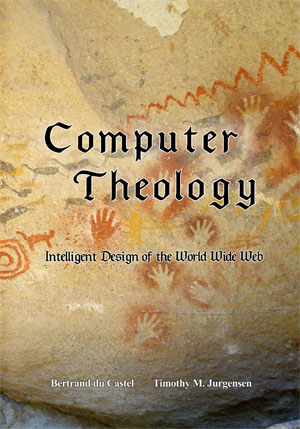| |
MIDORI PRESS |
 |
Computer TheologyBertrand du Castel and Timothy M. Jurgensen |
 |
| Reviews (Review Committee) |
|
|
|
|
Computers are complex tools of the human species. To make them work well for us, we have to specify their actions in very great detail. When properly instructed, networks of computers take on the trappings of human social orders derived from the physiological characteristics and capabilities of our species. To create a social order, we engage in grouping mechanisms through which the actions of the individuals within the group are influenced. From a technical perspective, such grouping mechanisms form the trust environments within which we can effect policy. Historically, the most comprehensive such environments have been formed by religions. Within a specific religion, the policy framework is established by a statement of theology. So, if we connect all the dots, when we want to tell our computers how to act in a manner paralleling human social orders, we must define for them a theology. [Read more]
Midori Press published in November, 2007, a limited edition of this book (ISBN 0-9801821-0-7) that was submitted to a panel of reviewers of various backgrounds and expertise. While the authors do not construe their review and subsequent comments as an endorsement of the assertions and conclusions of Computer Theology nor as an endorsement by the organizations with which they are affiliated, Bertrand du Castel and Timothy M. Jurgensen owe them a debt of gratitude for helping build a better argument and for correcting miscomprehensions.
Saad Bargach, M.S. Managing Director, Lime Rock Partners
Harry Barrow, Ph.D. Fellow of the Association for the Advancement of Artificial Intelligence, Scientific Advisor at Schlumberger
Ken Binion Assistant VP - Commercial Credit Reviewer, Sterling Savings Bank
Marilyn Binion, Esq., J.D. Semi-retired attorney and author
Kevin Bremer, M.B.A. Server and Workstation Market Analyst, Advanced Micro Devices
Jerome Denis, Ph.D. Marketing Director at Gemalto
Yi Mao, Ph.D. Principal Consultant, atsec
Mike Montgomery, M.S. Scientific Advisor at Schlumberger
Fiona Pattinson, M.S. Director Business Development & Strategy at atsec
Elena Perrin, M.D. Eli Lilly Fellow, Director European Medical Team at Eli Lilly
Mireille Piot, Ph.D. Professor of General Linguistics, University of Grenoble
Leonard Pojunas, Esq. General Counsel, North America, Gemalto
Guy Pujolle, Ph.D. Professor of Computer Science at the University of Paris, Professor Honoris Causa at Beijing University of Posts and Telecommunications
Bob Schwartzhoff, Ph.D. Defense Intelligence Agency
Mike Sheppard DPhil Schlumberger Fellow, Honorary Fellow of Darwin College, Cambridge
Edward L. Shirley, Ph.D. Professor of Religious Studies, St. Edward's University
Gerald Smith, B.S. Senior Consultant at Identification Technology Partners
Claire Vishik, Ph.D. Security & Privacy Standards & Policy Manager at Intel Corporation
© Midori Press, LLC, 2008 |
Search references |
Share news |
Share group |
Publish blog |
Save bookmark |
Record |
